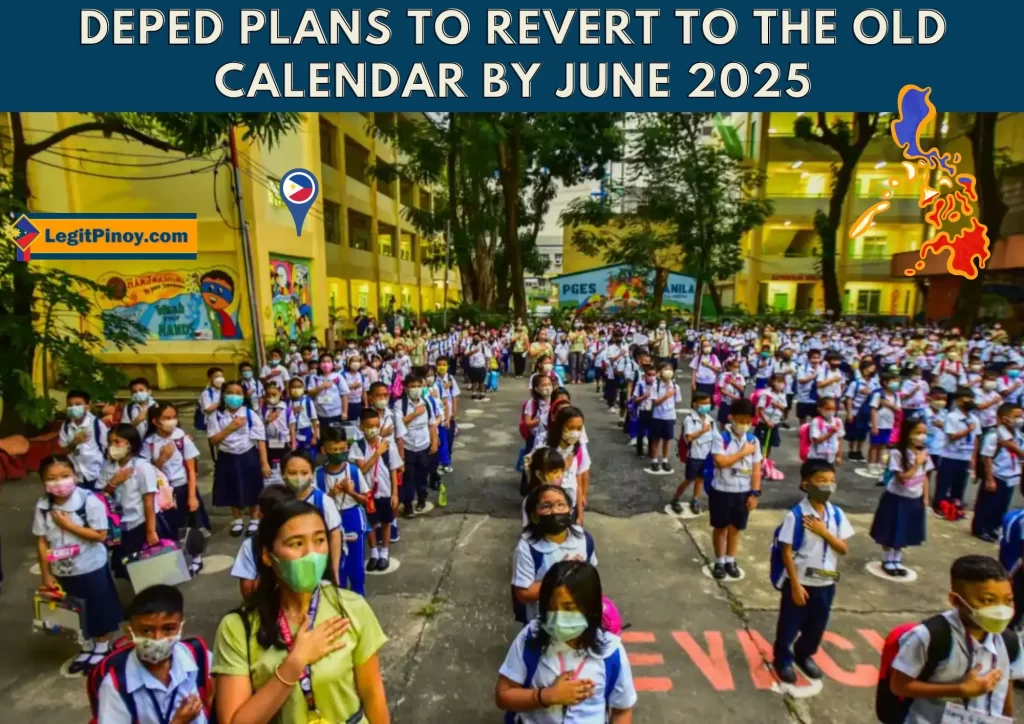DepEd Plans to Revert to the old Calendar by June 2025

DepEd aims to reduce classes and return to the traditional school calendar by June 2025, improving the academic schedule for students and educators.
Advertisement

Introduction
The Department of Education (DepEd) in the Philippines has announced plans to revert to the old school calendar, starting in June 2025. This decision marks a significant shift from the current school calendar, which was modified due to the COVID-19 pandemic.
Background of the Current School Calendar
In 2020, as the COVID-19 pandemic spread globally, the Philippine government, like many others, had to adapt its educational system to the new reality. To minimize the risk of virus transmission, DepEd shifted the start of the school year to October. This adjustment aimed to provide ample time to implement necessary health protocols, transition to blended learning modalities, and address the logistical challenges posed by the pandemic.
Importance of School Calendar Changes
- The school calendar impacts various aspects of educational planning, student performance, and administrative logistics.
- Aligning the academic year with traditional patterns can affect national exams, school holidays, and synchronization with international education systems.
Reasons for Reverting to the Old Calendar
Climatic Considerations
The Philippines experiences its rainy season from June to November, which often leads to class suspensions due to typhoons and flooding. By starting the school year in June, the most critical part of the academic calendar will avoid the peak of the rainy season, thereby reducing disruptions.
Alignment with Traditional Global School Calendars
Reverting to a June start aligns the Philippine school calendar more closely with those of other countries, facilitating international academic exchanges and benchmarking. This alignment is crucial for students seeking to study abroad and for educational institutions looking to collaborate globally.
Educational Continuity
The pre-pandemic school calendar was ingrained in the system for decades, creating a stable rhythm for students, parents, and educators. Returning to this familiar schedule can help restore a sense of normalcy and stability in the educational sector, which has been significantly disrupted by the pandemic.
Health and Well-being
The shift to an October start meant that students and teachers had to endure the hottest months of the year (March to May) in school, which could affect comfort and concentration. By moving the academic calendar back to its original timeline, students and educators can avoid the hottest months and create a more conducive learning environment.
Implementation Plan
DepEd’s decision to implement this change in June 2025 allows ample time for a smooth transition. Schools will have over a year to prepare for the shift, ensuring that all logistical, administrative, and curricular adjustments are effectively managed. This gradual transition period also provides an opportunity to address any potential challenges that may arise, ensuring that the change does not disrupt the ongoing educational activities.
Expected Outcomes
| Expected Outcome | Description |
|---|---|
| Reduced Weather-related Disruptions | Avoids peak of the rainy season (June to November), minimizing class suspensions due to typhoons and flooding. |
| Alignment with Global Calendars | Synchronizes the Philippine school calendar with international systems, facilitating academic exchanges and global collaborations. |
| Restored Educational Continuity | Returns to a familiar schedule, restoring stability and a sense of normalcy for students, parents, and educators. |
| Improved Health and Well-being | Avoids the hottest months (March to May) for school activities, creating a more comfortable and conducive learning environment. |
| Smooth Transition | Provides over a year for schools to prepare, ensuring a well-managed shift with minimal disruption to ongoing educational activities. |
| Enhanced Academic Planning | Allows for better academic planning and scheduling, aligning with traditional examination periods and school break patterns globally. |
| Increased Productivity | Teachers and students can plan their activities around a stable and predictable schedule, leading to improved productivity and engagement. |
Feedback from Educators, Students, and Parents on DepEd’s Plan to Revert to the Old Calendar by June 2025
I. Educators’ Perspectives
- Supportive Views:
- Educators may appreciate the return to a familiar calendar, which can help in planning and executing curriculum effectively.
- The alignment with traditional educational patterns may be seen as beneficial for student learning and engagement.
- Concerns:
- Some educators may worry about the transition process and the potential disruptions it may cause to ongoing academic activities.
- There might be concerns about addressing the learning gaps resulting from the pandemic effectively within the confines of the old calendar.
II. Students’ Reactions
- Mixed Responses:
- Some students may welcome the return to the old calendar, particularly if it means a more predictable schedule and alignment with other activities.
- Others might express disappointment if it means shorter vacation periods or changes to planned activities during the current calendar.
- Impact on Learning:
- Students may express concerns about how the calendar change will affect their academic performance and preparation for exams.
- Those who struggled with remote learning during the pandemic may have varying expectations about returning to in-person classes.
III. Parents’ Opinions
- Support for Stability:
- Many parents may support the move back to the old calendar, especially if it brings stability to their children’s education and aligns with their own work schedules.
- They may appreciate the consideration given to climate and cultural factors in the decision-making process.
- Logistical Concerns:
- Parents might express concerns about logistical issues such as childcare arrangements during vacation periods and adjusting family schedules.
- Some may also worry about the impact of the calendar change on extracurricular activities and family plans.
IV. Overall Reactions
- Communication and Consultation:
- The extent to which DepEd consulted with stakeholders and communicated the rationale behind the calendar change could influence overall perceptions.
- Transparent communication and opportunities for feedback may help alleviate concerns and garner support for the transition.
- Adaptation and Support:
- Providing resources and support to help stakeholders adapt to the new calendar, such as professional development for educators and transition assistance for students and families, will be crucial.
- Continued dialogue and monitoring of the impact of the calendar change on various stakeholders will be necessary to address concerns and make adjustments as needed.
Links to Official DepEd Announcements and Documents
- Official Announcements:
- DepEd regularly updates its official website with news and press releases. For the latest announcement regarding the school calendar revision, visit the DepEd Official Website.
- Specific announcements can also be found on DepEd’s official social media channels on Facebook and Twitter, where updates are posted frequently.
- Official Documents:
- Detailed documents such as Memoranda, Department Orders, and other official communications can be accessed through the DepEd Orders page on their website. Relevant documents related to the school calendar change can be found here.
- For historical documents and more extensive archives, the DepEd Transparency and Accountability portal provides access to various official documents.
Conclusion
The Department of Education’s (DepEd) plan to revert to the old school calendar by June 2025 marks a significant policy shift aimed at addressing several key educational and logistical concerns. This decision, rooted in the desire to improve academic performance, align with climate considerations, respect traditional agricultural and cultural cycles, and enhance administrative efficiency, demonstrates a comprehensive approach to optimizing the educational experience for students and educators alike.
Feedback from educators, students, and parents highlights a mixture of support and concerns, reflecting the diverse impact of such a change. Educators anticipate benefits in curriculum planning and student engagement, while also expressing concerns about the transition process. Students have mixed reactions, balancing the prospects of a stable schedule with potential disruptions to their current routines. Parents largely support the move for its stability but are mindful of logistical challenges.
For further information, stakeholders can access official DepEd announcements and documents through their website and contact DepEd directly for inquiries and feedback. Additionally, exploring academic articles, case studies, and reports on school calendar reforms can provide deeper insights into the potential impacts and best practices.
The planned revision to the old school calendar represents DepEd’s commitment to a holistic and adaptive education policy, striving to meet the evolving needs of students, educators, and the broader community. By addressing various practical and cultural considerations, DepEd aims to create a more effective and supportive educational environment that fosters improved learning outcomes and overall well-being.
You May Also Like
Advertisement

- Celtics Vs. Heat Game
- Toni Fowler’s pregnancy
- Heatwaves in the Philippines: Impact to Students
- Sarah Duterte
- Mobile Legends New Hero: Chip
- Demon Slayer: Hashira Training Arc
- Asoka inspired makeup: San sanana Trend on Tiktok
- Labor Rights
- Diwata Pares received 1 million pesos and house and lot from Rosmar
- Kaila Estrada’s acting skills is on fire
- David Corenswet as superman
- Mother’s Day 2024
- High Street
- Flirt
- Box Office King and Queen: Alden and Kathryn
We also recommend the following:
- Peraplay
- Swerte99
- 30Jili
- OtsoCC
- Royal888
- Duke777
- 5Jili
- Okebet168
- Majesty33
- BK8
- Betso88
- Int Games
- Bet86
- Lucky Calico

Jill Lynn is a versatile blogger and content creator who loves writing about a variety of topics. From travel and lifestyle to food and wellness, she shares her experiences and insights with readers around the world. With her authentic voice and engaging storytelling, Jill has built a strong online presence and a supportive community of followers. Her passion for writing and dedication to producing quality content continue to inspire others on their own journeys.
